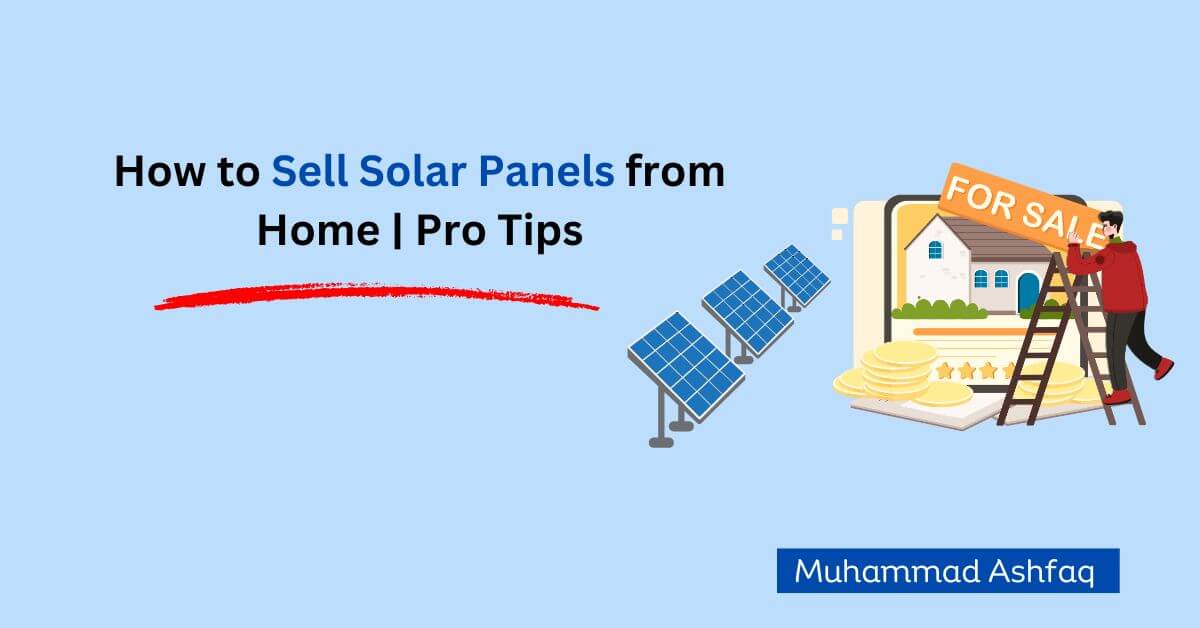How to Sell Solar Panels from Home | Pro Tips
Are you considering selling solar panels from home? It’s a new business idea with many upsides.
It allows you to be your own boss, avoid office expenses, and tap into a rapidly expanding market.
With the solar sector experiencing an average annual growth rate of about 25% since 2000, it has endless possibilities for those prepared to take action.
This guide will take you through the key steps you need to start—covering everything from market research to setting up your business.
Having worked with the solar industry for years, I’ve learned what works and what doesn’t.
Here are my pro tips for successfully selling solar panels from home.
Key Takeaways
- Conduct market research to find high-demand areas.
- Choose a business model: consultant or direct seller.
- Partner with a reliable supplier for quality panels.
- Build a professional website and use social media.
- Showcase customer testimonials to build trust.
- Offer financing options to ease upfront costs.
What to Keep in Mind Before Starting
It’s important to keep in mind that it’s not a bed of roses. There will be challenges along the way.
From understanding market dynamics to dealing with competition and building trust with potential customers.
However, the opportunities are vast if you are confident and prepared to put in the effort.
Get yourself ready for these quick questions:
- Are you ready to face the challenges of a competitive market?
- Do you have a plan to build trust with potential customers?
- How confident are you in your ability to overcome initial obstacles?
- What is your unique selling point that will make customers choose you over others?
Now, let’s dive into the tips for starting your home solar business:
Conduct Market Research
The first step to selling solar panels is understanding who you’re selling to.
Conducting market research is crucial because not everyone is ready to switch to solar.
You’ll need to identify areas with the highest demand and understand your audience’s needs.
If you live in an area where electricity prices are high, that’s a great starting point. Customers in these areas are already looking for alternatives to bring down their costs.
Study your local competition, understand their pricing, and see what value you can add.
You should also research the incentives or rebates available in your area—solar is often more attractive to customers when they know they’ll get a tax break or rebate.
Choose Your Business Model
When you decide to sell solar panels, you’ll need to choose a business model. There are two primary options—being a solar consultant or selling solar equipment yourself.
Being a Solar Consultant
As a consultant, you focus on educating potential customers, explaining benefits, and earning commissions for every sale you make through your partnered solar companies.
It’s a less risky approach if you’re just starting.
Being s Solar Seller
Alternatively, you could source and sell the panels yourself. This model requires more startup capital, but it also means more control and higher profits.
Choosing between these models depends on your comfort level with risk and your upfront investment capacity.
Check Out: Need SEO content that builds trust and attracts solar leads?
Find a Reliable Supplier
Once you have a business model, it’s time to find a supplier. A reputable supplier can make or break your business.
When working for an electric utility company, I learned that customers appreciate quality.
The supplier you choose should offer high-quality solar panels and warranties that will reassure customers.
Look for suppliers with a history of reliability, high-efficiency rates, and strong customer reviews.
When you contact suppliers, ask questions—inquire about delivery times and support services.
Your relationship with your supplier is crucial for providing a positive customer experience.
Develop a Financial Plan
A solid financial plan is essential. Selling solar panels isn’t without cost—website setup, advertising, and inventory (if you’re stocking panels) can add up.
Plan out your costs and expected revenue so you have a clear understanding of what to expect.
Make sure to factor in operational costs such as customer support, maintenance, and potential shipping fees.
A well-prepared financial plan will help you avoid surprises and allow you to grow your business sustainably.
Explore Niche Markets
Solar energy is versatile. You don’t just have to sell to homeowners.
Several niche markets could benefit from solar energy, such as:
- Tiny homes that need compact, efficient energy systems.
- Farmers require energy for irrigation and other operations.
- Far-flung areas interested in storage solutions
- Urban businesses are interested in reducing energy costs.
These niche markets are often less saturated, giving you a better opportunity to gain market share.
Always Start Small
Don’t feel like you need to start on a grand scale. Starting small lets you test the waters and gain experience before investing too heavily.
Offer your services to friends, family, and your local community first.
This will help you understand how to address customer needs and iron out any kinks in your sales process.
Selling solar is a long-term game, and by starting small, you can learn as you go without taking on significant financial risk.
Set Up Your Online Presence
If you’re selling from home, having a strong online presence is a must. Your website should convey trust.
Customers often research a company before buying, viewing 3-4 pieces of content before contacting a sales representative.
This means you want to make a great first impression. Your website should include essential information like:
- Products
- Services
- Customer testimonials
- And solar incentives in your area.
In my years working in the industry, I found that providing detailed content, such as articles explaining how solar works or calculators that show potential savings, helps establish authority.
You can also leverage social media platforms like Instagram, Facebook, and LinkedIn. Regularly post helpful information, success stories, and updates to keep people engaged.
Offer Social Proof
Social proof is a psychological phenomenon where people look to others when making decisions.
Showcasing social proof on your website and social media can boost credibility.
Display customer testimonials, share case studies, or post before-and-after energy bill comparisons.
When I worked alongside solar installers, they often brought past customers to events to share their experiences. This kind of social proof is invaluable
It shows potential clients that your service delivers real results.
Leverage Content Marketing
Content marketing is a powerful tool for generating leads. By creating informative blog posts, videos, and infographics, you can educate your audience.
And establish yourself as an authority in the solar industry.
Write content that answers common questions about solar energy, such as “How do solar panels work?” or “What are the benefits of solar power?”
Create content that is easily shareable on social media to reach a wider audience.
For more details about how to kickstart your solar journey, check out my solar content marketing service page.
Build Partnerships with Local Businesses
Partnering with local businesses is a great way to grow your solar panel sales.
Consider partnering with home improvement stores, electricians, or construction companies.
These businesses already have relationships with homeowners who might be interested in solar energy.
For example, electricians can recommend your services when they’re working on a customer’s home.
Partnerships like these create a win-win situation and expand your reach without significant marketing costs.
Utilize Email Marketing
Email marketing is an effective way to stay connected with your leads and customers. Create a mailing list by offering a free resource, like a guide to solar savings or a free consultation.
Once you have a list, send out regular emails with helpful information, updates, and special promotions.
Personalized emails that address customer needs and answer common questions can help keep your brand top-of-mind.
It’s also a great way to inform leads about new incentives, special offers, or upcoming events that might interest them.
Offer Financing Options
One of the biggest hurdles for customers considering solar is the upfront cost.
You don’t need to provide financing yourself—just work with a local bank or refer customers to local financing institutions.
Financing can make solar affordable for people who may not have the cash available upfront.
By making it easy for customers to understand their payment options, you increase the likelihood of closing the sale.
Attend Local Events and Trade Shows
Attend local fairs, community events, or trade shows where you can set up a booth and talk directly to potential customers.
Bring informational brochures, solar panel samples, and success stories to help educate attendees.
In my experience, face-to-face interactions build trust much faster than online communication.
People like to buy from people they know, and being present at these events helps you establish a personal connection with your audience.
Encourage Reviews and Referrals
Happy customers are your best marketing asset. Encourage them to leave reviews on your website or Google.
Positive reviews build trust and provide social proof, which is vital when selling a product like solar panels.
Referrals are equally powerful. You could create an incentive program where satisfied customers earn a reward for bringing in new leads.
Provide Excellent Customer Service
Selling solar panels isn’t just about the product—it’s also about the experience. Customers are likely new to solar, and they may have many questions.
Answering these questions with patience and providing clear information can set you apart from competitors.
If a customer feels heard and their questions are addressed, they’re much more likely to buy from you.
Set up a customer support system—this can be as simple as responding to emails quickly or offering phone consultations.
Going the extra mile here can turn potential leads into loyal customers.
Concluding Insights for Selling Solar
Selling solar panels from home is an exciting and potentially rewarding opportunity.
By starting small, focusing on customer experience, and providing social proof, you can establish yourself as a trusted seller in the solar market.
Use these pro tips to guide your journey, and you’ll be well on your way to building a thriving home-based solar business.

Content Writer | Assistant Manager (Electrical) at IESCO
As a passionate content writer, I’m on a mission to make solar hassle-free for you through my expert guides and easy-to-digest content.

